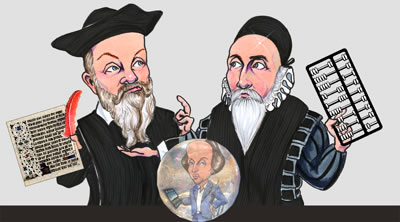It's An Omen!
Shakespeare Had Much to Say
About Predicting the End of the World
When I see a meteor shower, I feel I'm on the cusp of a special time. I've always felt that. For a long time, if I chanced to glance at a digital clock showing the time to be 11:11 (which seems to happen with great frequency), I thought it signified something much more than the passing of that minute. Similar random coincidences I often took to be omens; so much so that now it's become an inside joke for Sarah and me, as we'll both shout simultaneously, “It's an omen!” Hey, isn't speaking the same thing simultaneously an omen, too?
 Lately, here in the D.C. area, we've been experiencing ominous events of Shakespearean proportions: record snows, record heat, record rain, tornadoes, hurricanes, floods, and an earthquake, for goodness sake. Any day I expect to see a lion walking from the Capitol (and I don't mean that allegorically; there don't seem to be any figurative lions in American politics these days). On top of all of this natural phenomena is the popular obsession with Harold Camping's prediction that the world would end May 21; no, make that Oct. 21; well, as of this writing, it's yet to come. Then again, the Mayans may have predicted the end to come December 21, 2012, which is when their calendar stops. We've all got one more year to live, people! But, does that mean I should be worried when I seek an on-line calendar of events and get a message saying, “April 2012 not available”?
Lately, here in the D.C. area, we've been experiencing ominous events of Shakespearean proportions: record snows, record heat, record rain, tornadoes, hurricanes, floods, and an earthquake, for goodness sake. Any day I expect to see a lion walking from the Capitol (and I don't mean that allegorically; there don't seem to be any figurative lions in American politics these days). On top of all of this natural phenomena is the popular obsession with Harold Camping's prediction that the world would end May 21; no, make that Oct. 21; well, as of this writing, it's yet to come. Then again, the Mayans may have predicted the end to come December 21, 2012, which is when their calendar stops. We've all got one more year to live, people! But, does that mean I should be worried when I seek an on-line calendar of events and get a message saying, “April 2012 not available”?
While such omens seem to happen with great frequency, whatever they are supposed to portend seems to me to happen with an even greater degree of infrequency, if they happen at all. Nevertheless, all this omen-gazing by people and the press today—and the fact that my clocks seem perpetually stuck on 11:11 lately, not to mention my being rattled by an earthquake in Virginia greater than all the quakes I felt over three years living in Alaska—got me to thinking of Shakespeare's take on omens, for his plays are full of them.
Some Shakespearean omens are truly significant, like the horses eating each other on the night of Duncan's assassination in Macbeth. That certainly portended something scary, more so than the fact that noontime was as dark as night (a phenomenon otherwise known in Scotland as a winter day). Other omens are more benign, like the music coming from the earth in Antony and Cleopatra; some soldiers thought it portended well for the coming battle, but others thought it represented the spirit of Hercules leaving Antony's side.
Whole scenes are devoted to omens in Julius Caesar, including one heckuva thunder and lightning storm (described by two different characters as either dropping fire or warriors battling in the heavens), people walking about in flames, a surly lion strolling the streets of Rome, a lioness giving birth, graves yielding up their dead, a sacrificed beast missing its heart, and a “bird of night” sitting in the marketplace at noon “hooting and shrieking.” (Noon? I bet it was really 11:11.) To all of this, Caesar's wife, Calpurnia, makes the famous observation that “when beggars die, there are no comets seen; the heavens themselves blaze forth the death of princes.” Awfully presumptuous of her, don't you think? Then again, if she's right, no wonder I feel a sense of safe whenever I see a meteor shower.
Aside from the heavenly predictors, Shakespeare presents a number of human prophets throughout his plays. One of his earliest plays has Henry VI seeing a glorious future for England in the fate of a young Richmond he has just met; a Richmond who goes on to become Henry VII, proving Henry VI right! In one of Shakespeare's last plays, Henry VIII, we see Cranmer prophesying that the king's newborn baby, Elizabeth, will become one of England's greatest princesses. You certainly can put money on that one. More remarkably, in Troilus and Cressida, the character of Pandarus foretells that if the rendezvous he sets up between the two titular lovers goes awry, his name will be associated with prostitution forever. He may have ended up the original pander, but I'd take him to Vegas with me more for his skills at prediction than for anything else he could provide on the trip. Of course, these predictions are put in the mouths of characters by an author who had the benefit of hindsight; Shakespeare was the ultimate Monday morning quarterback.
The most famous predictions in the Shakespeare canon are more instructive. Everything the Weird Sisters tell Macbeth comes true. Yet, their second pronouncement—calling him Thane of Cawdor—was not really a prediction but a statement of fact of which he was unaware. Their third pronouncement, that he would become king, Macbeth himself ensured would come true by killing the current king and positioning himself as the natural choice to succeed. The Weird Sisters also nailed every one of their second round of predictions despite Macbeth's resistance. Yet, he didn't so much fail to foil inevitable outcomes as, in the one case, he simply defied the warning about Macduff, and in the other two, he misinterpreted what the witches meant by “none of woman born” and Birnam Wood coming to high Dunsinane Hill.
Here Shakespeare reveals the real nature of predictions and omens and how we should regard them: with skepticism or, at least, grasping their full context—if we can. Antony's soldiers can't agree on what the mysterious music means, and Macbeth treats figurative language literally. In Julius Caesar, when Casca reports all the strange happenings on the eve of Caesar's assassination, from men aflame to a bird reporting for the wrong work shift, Cicero responds: “Indeed, it is a strange-disposed time: But men may construe things after their fashion, clean from the purpose of the things themselves.” One of my favorite Shakespeare scenes is the rebel council in Henry IV, Part 1. After Glendower boasts that an earthquake and yet another sensational lightning storm accompanied his birth, Hotspur counters with “So it would have done at the same season, if your mother's cat had but kittened, though yourself had never been born.”
I also am intrigued by Shakespeare's two different mentions of lions among the omens in Julius Caesar: one, a surly lion walking the streets; the other, a lioness whelping. Perhaps these are two separate (or, given the surliness involved, related) incidents, but they also could be two diverging reports of the same thing. This is something that also happens when it comes to omens and predictions, like finding Christian meaning in a Mayan calendar that might simply have run out of room on the stone, or deciphering the writings of John the Divine. While many people gleen prophetic meaning from John's vision, and I wonder if John was doing mushroom on that island and hallucinating, my father, a minister by profession, contends Revelations was simply instructions to the churches written in code to avoid Roman censure; he believes Jesus' promised “second coming” had already occurred when he appeared to the Apostles back in Acts.
Harold Camping, reportedly a brilliant engineer but by his own admission dismissive of biblical scholarship, used mathematical formulas to find in the Bible not only an exact date but also an exact time for the Rapture. I consider deciphering the Bible in this way similar to looking for clues to Shakespeare's identity in Hamlet or The Tempest (albeit, looking for biblical clues can be far more dangerous). Such “discoveries” tend to totally ignore contexts in which the verses were originally written. No matter how complexly clever Camping's arithmetic skills may be, how can you pinpoint a current time and date in a document written centuries before time, let alone time zones, was invented by people using a different calendar than that we operate on now?
Interestingly, Shakespeare did give us a vivid vision of the world's end in The Tempest, as Prospero relates it: “The cloud-capped towers, the gorgeous palaces, the solemn temples, the great globe itself, yea, all which it inherit, shall dissolve and … leave not a rack behind.” Notably, Prospero doesn't suggest when this all might happen. For that, let's turn to Hamlet for a key clue. “We defy augury,” he says to Horatio. “There's a special providence in the fall of a sparrow. If it be now, 'tis not to come: if it be not to come, it will be now: If it be not now, yet it will come: The readiness is all.”
Eric Minton
November 11, 2011
[It's an omen!]
Comment: e-mail editorial@shakespeareances.com
Start a discussion in the Bardroom



 Find additional Shakespeareances
Find additional Shakespeareances